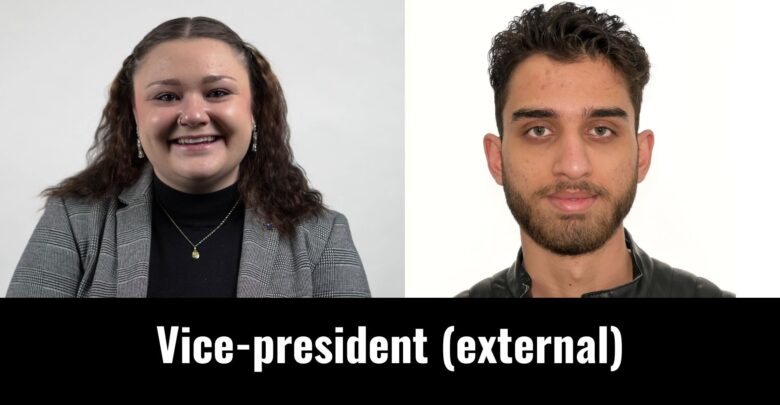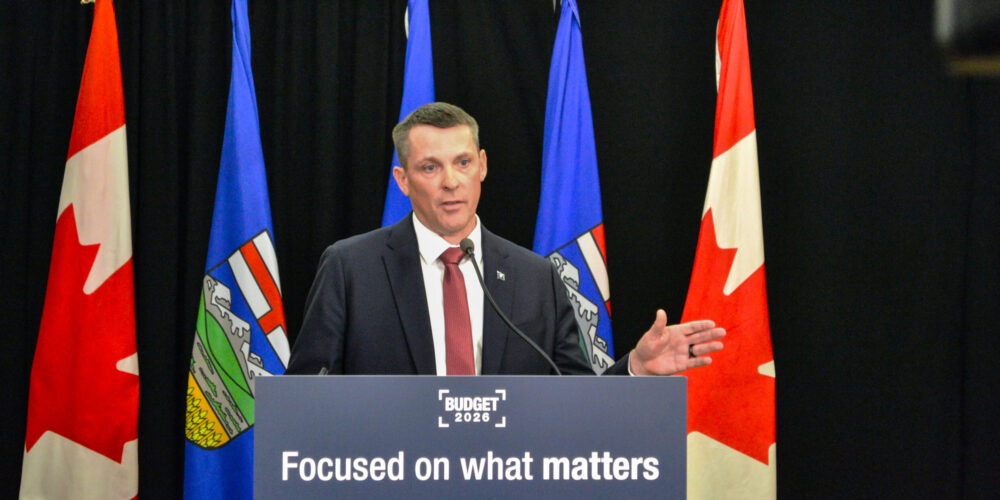SU Elections 2024 Q&A: Vice-President (External)
There are two candidates in the 2024 SU Elections vice-president external race — Abdul Abbasi and Logan West.
 Lily Polenchuk
Lily PolenchukThe Students’ Union (SU) vice-president (external) represents the undergraduate student body at the University of Alberta through external advocacy. They work with all levels of government on issues that impact students, such as tuition increases. The VPX also works closely with post-secondary lobbying groups, such as the Council of Alberta University Students (CAUS) and the Canadian Alliance of Student Associations (CASA).
There are two candidates in the 2024 Students’ Union vice-president (external) race:
- Abdul Abbasi, a third-year biology student and former Augustana councillor on Students’ Council.
- Logan West, a fourth-year film studies student.
The following interviews have been edited for brevity and clarity.
Why have you decided to run for vice-president (external)?
Abdul Abbasi: I have always wanted to help students. Whether it was being a SU councillor for Augustana or being a part of the Augustana Students Association (ASA). Seeing Augustana’s programs getting cut, like we don’t have minors — except in music and business — because of program cuts and program restructuring. I wanted to fight for the betterment of students. To be honest, the primary responsibility I think for the vice-president (external) is to be a voice for students, and especially for those that are underrepresented. Either coming from Augustana, which everyone almost forgets about, or whether it’s coming from a South Asian community. I wanted to become a representative for all students.
Logan West: First of all, I’m not running to do it as a resume-padding or to get a career in politics kick-started or something. I’m really doing it because I was fortunate enough to go abroad to California last year and get involved with some of the advocacy on campus there. Coming back, I wanted to bring that back with me, what I had learned and the knowledge I gained. I want to run because I’m really tired of complaining on the U of A subreddit, and just feeling sort of voiceless in it. When I did a job shadow in January, I realized that getting involved in the SU was a way that I could go about effecting some kind of change on some sort of level. Through that job shadowing, I really started to learn that the only way that we can make a change is if we get involved, so I’m getting involved.
What would you say are the three main takeaways from your platform?
Abbasi: Number one is affordability. In that I feel like that every time we’re like, ‘oh we need to keep lessening fees,’ this year, we’re going to have two per cent [tuition increases] — but how many students know about the financial aid they can get? About the scholarships they can get? As a domestic student, you can get $4,200 of grants each year, you don’t need to apply for student loans. You just apply for grants and you get grants, rather than I think it is important to keep that pretty simply but, to be honest, in this government, is it realistically possible? If the government changes or if something changes all of a sudden, it’s not possible. The second is sexual violence prevention, mental health support, and permanently lifting the international work bans.
West: Number one’s got to be health and wellness. I think following that, mental health support — making sure that we have adequate resources for students of a diverse amount of backgrounds. People come to this campus, not just from all over Alberta, but all over the world. Making sure that we have what students need, and that we have the funding in place to give students the resources that they need. Alongside that, our sexual and gender-based violence funding. We really need to be working on that and addressing those needs and ensuring we have diversity within those resources for all students of all backgrounds. Transportation and safety is a big one for me as well. I really want students to be involved in what’s going on on campus. When students feel safe, and they have consistent, reliable transportation or when they’re not waiting out at minus 40, they show up. Then lastly, I would say affordability. Obviously, we have our concerns, about tuition, housing, and food, and those are all very important issues to me.
The vice-president (external) is responsible for advocating on behalf of all students to advocacy groups, lobby groups, and both the provincial and federal government, which can be intimidating, Why should students trust you to advocate on their behalf?
Abbasi: I think I have experience being a SU councillor for Augustana and as the secretary of the Muslim Committee we have in Camrose. The main thing I would say I did as an Augustana councillor was talk with people so that Augustana is more well-known. That’s what Augustana needs. So I talked with deans, I talked with the Board of Governors (BoG) representative, I talk to the General Faculties [Council]. Anyone I can meet to talk about Augustana. And I’m pretty confident that I can get included easily.
West: I think up until this last semester in the fall, I was the average student. I came to school, I did my classes, and I went home. Of course, I had my concerns, but I was never really that involved. I would say that I understand, I think, closer to what the average student is going through. I think consultation is really important, and that comes with the vice-president (external) role. I think when you’re dealing with so many different kinds of groups on campus, if you’re not consulting with them to ensure that everyone’s voices are being heard, how can you effectively represent those people? This is a position voted for by the students at the U of A and it would be selfish to represent the opinions of anyone but those students. I think ensuring that I’m never speaking over people’s voices, and instead as vice-president (external) having the honour and the privilege to speak on behalf of those voices. So I think consultation and collaboration are essential.
With proposed tuition increases and past budget cuts to the university, students have expressed a need for direct action. How do you hope to address this?
Abbasi: That thing comes back to the point I was trying to make. For next year, the proposed tuition is a two per cent increase for domestic rather than the 4.79 per cent that it was supposed to be. I’m not saying that we need it because we don’t want any increase but is it realistically possible? I will work with the university, the government, and the SU to make financial aid more available for students. It’s not only about tuition. It’s more about the housing and the food. Like at the food bank, almost 1,000 people are using it monthly, so we need to take care of that. The fee is the most important thing but the food, the housing, and everything else is also important.
West: In my conversations with students on campus affordability, specifically related to tuition, cost has been a number one concern raised by students across all faculties. I think that itself speaks to students looking for a change, and hopefully signals that students are going to be willing to get more involved. If the SU is involved with organizing more protests or letter-signing campaigns, etc., I do hope to see students joining in on the activism. I also hope to see some sort of incentives provided to students for attending these things. We do know that if we provide food at events or other sorts of things for people to come, they will show up more. Sort of incentivizing people to show up to have their voices heard. I think showing the students of this campus that the government does listen when we are loud enough and have enough numbers behind us.
The federal government recently announced multiple changes to the International Student Program, including a cap on the amount of study permits granted. How will you work to ensure international students are advocated for to both the federal and provincial government?
Abbasi: I have done some research and it doesn’t affect Alberta. It’s mainly for Ontario and British Columbia (B.C). Last year, Alberta gave away 34,930 student permits and the next year with the new program we’re giving 42,250 international student study permits. If we depend so much on international student fees, and if that goes away, then we have to increase domestic fees. That’s going to be harder, but it’s not affecting us. At this point we don’t know the exact number yet, but I hear it’s increasing like 7,000 for Alberta international student permits. We’re not going down in that regards, it’s mostly targeted to B.C. and Ontario.
West: So working in very close collaboration with the International Students Association (ISA) this year is going to be essential to understanding how it can meet the needs of international students. I am concerned about what the federal government has been doing. Obviously, I feel Alberta will not be as effected as somewhere like Ontario, but we will still see a likely reduction. Which will also cause problems for us internally as a university when it comes to funding because where are they going to come up with the money that international students have traditionally brought in through tuition if we’re accepting less international students next year? I think that, again, collaborating closely with the ISA ensures that international students’ voices are heard on these matters, and also ensuring that the government hears us loud and clear when we say that we stand with our international students and support them. I’m not gonna leave them out of the conversation.
– With files from Dylana Twittey




